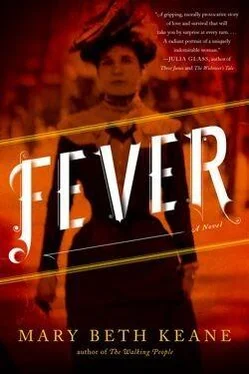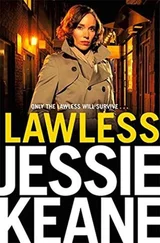When he got outside to the street for the first time in eleven months, he walked immediately to Dr. Tropp’s office. He told the doctor that the nuns had given him pills, but that at night he needed something stronger. Just as he’d hoped, Dr. Tropp asked if he was familiar with administering medicine by needle. “Of course,” Alfred said. Once Alfred had paid, the doctor handed over a small bag containing a single glass syringe, two needles, several vials of liquid morphine, a prescription for more. Back on the sidewalk, Alfred placed the bag carefully in his jacket pocket. He climbed the long staircase to the El platform and protected his pocket as the train pulled in and the other riders pushed against him. His arm was ugly but worked just fine. He could grasp a fork, turn a knob. Sometimes it ached and felt tired. They had shown him exercises to make the muscle stronger, but he found the medicine was the best to help that feeling of lopsidedness, of tightness on one side and looseness on the other. The medicine was an equalizer and made his whole body the same, his thoughts peaceful and quiet and the days kind. His chest was taut, like the skin there had shrunk, but the medicine helped that, too. With the medicine he felt at ease, and he moved along the paper-strewn streets in an even rhythm, throwing one foot loosely in front of the other, feeling the momentum of his arms swinging by his side. Even his head felt perched perfectly at the top of his neck. At Thirty-Fourth Street he climbed the stairs to the street, walked south one block, and then across, all the way east, until he spotted the old building. He halted, brushed his pocket to make sure nothing had been damaged. He moved a little closer, and then sat down on a stoop.
Was she still at the same laundry? Still staying with Mila? It wasn’t long before he saw her, walking up Third Avenue from the opposite direction, a young boy on either side of her. They were talking, competing for her attention, and she was serious with them though Alfred could see that whatever they were saying, she was happy. She was holding a box. She placed her hand on the head of the shorter boy, and he took the box from her. The two boys ran ahead and she shouted something after them. She touched her collar, the back of her hair. She looked young. Nowhere was that put-upon expression she used to wear, that hard look she got when she moved around him in their rooms, running a rag across the counter, closing her mind to the fact that he was there. If he washed a pan he should have scoured it. If he put away the sugar, she found some he’d spilled on the floor. He was useless. He was lazy. He was a drunk. He didn’t love her. He didn’t know the half of what she did for him.
“Alfred,” she used to say, more softly than she ever spoke when he was sober. “You have to stop this.”
She quickened her step, and Alfred walked out to the middle of the sidewalk. She was directly across the street now. If she turned her head, she’d see him there. Do it now, he told himself. Now. But he just watched her, and then she was gone, disappeared into the building and up the stairs.
• • •
Driscoll was dead, the Lower East Side was off-limits in case he would run into Liza, so Alfred paid the bartender to sleep on a cot in the back room of Nation’s for a night. He had no desire to have a drink, and again wondered at his old self. The next morning, he went downtown to talk to Jimmy Tiernan. Jimmy knew someone who knew someone who’d gotten work in Minnesota, clearing land, and who said it was the best work he’d ever had in his life. Hard work, but good work. Clean air. No punch card. No boss breaking balls every minute. Jimmy wanted to go there himself, but Patricia would never agree to it. They could build a log house — three, four, five rooms, however many they wanted. They could clear land and sell the timber. They could keep livestock. Plant crops. But the farthest Patricia would go was Queens. He laughed. “But you,” he said to Alfred, “what’s stopping you? Go in the spring, when the weather isn’t so bad.”
It had been raining in New York for two weeks. Steady, gray, wet rain that made the city wilt. In Minnesota, in the winter, Jimmy said it gets too cold to rain. The air would freeze the damp hairs inside a man’s nose, but at least the sky was blue and big.
A train left Grand Central Terminal for Chicago twice a week. From Chicago Alfred could switch to a train headed for Minneapolis. From Minneapolis he’d just have to find his way as the days took him. It was difficult imagining there were cities so far away, cities with their own riverfronts and barges and garbage and odors. It was sobering to think of traveling so far, at such speed, and still covering only half of America. New York was not like the rest of America, not even close. Anyone who read a paper knew that. In Minnesota every farm had good water, a creek slicing through, rich earth, plentiful grazing. The people ate only white bread and meat, every day. The trees grew up straight and grazed the sky. There were people who set up their homes and didn’t see other families for all of winter, which in Minnesota lasted a full six months. In New York, there was no way to escape other people, acquaintances and strangers — they brushed by him every minute of every day, begging for coins, asking that balances be paid. They bumped him in the street without apologizing. They smelled of their kitchens, their cabbage and beets and smoked meats and spices brought all the way from the old country, sewn into the linings of cuffs and pockets. They grabbed the best of the fruit at the market and grazed his toes with their automobiles or their wagon wheels as he crossed the street. Minnesota wasn’t the only option. There were other places: Wisconsin. Wyoming. New Mexico and Arizona were said to be hot year-round, and if a man went walking in the desert he’d be tanned like leather inside an hour. There were Indians in the middle country. New York had places with Indian names but no Indians anymore. They’d all gone west.
He told Jimmy it was a good idea. He didn’t need to think about it. He’d go. He’d build a house there, way out in the country, and send for Mary. One way or another, he’d convince her to give him another chance, to join him out west where they could truly start over again. He hated thinking about the last time they’d spoken, that morning in the vestibule of the old building, the sight he must have been after so many days drinking, sleeping here and there. And the look on her face that told him how serious she was, how desperate she was to make him go away. When he spoke to her next he’d have something to show for himself. A plan. She’d see how sorry he was.
“Now?” Jimmy had asked. “Wait until Christmas. Wait until the New Year.”
“Now,” Alfred said.
He bought an honest ticket to Chicago, and an honest meal aboard the train, but for the switch between Chicago and Minneapolis he slipped onto the train and into the tiny lav until the train started moving. When he finally opened the door an attendant saw him and was about to shout when Alfred held up his hand and then with the other hand reached deep into his pocket. A dollar would shut him up, and was still less than the price of a ticket. Feeling tired, and beginning to worry that it was a terrible idea to venture so far from New York, Alfred stepped back into the lav and with one foot bracing the door, and the other on the ledge of the commode, he removed a needle from his jacket pocket, wiped it on his shirt, attached it to the delicate syringe, and pushed it into one of the small vials of morphine. He drew the plunger back as the train leaned into a turn. For the rest of the journey the young man ignored him as Alfred slept across two seats at the rear of the car, and when he wasn’t sleeping he stared out the window at the trees, which grew taller and stronger the closer he got to Minnesota. He pictured the trees in New York, imagined them gasping for air, fighting for space.
Читать дальше












